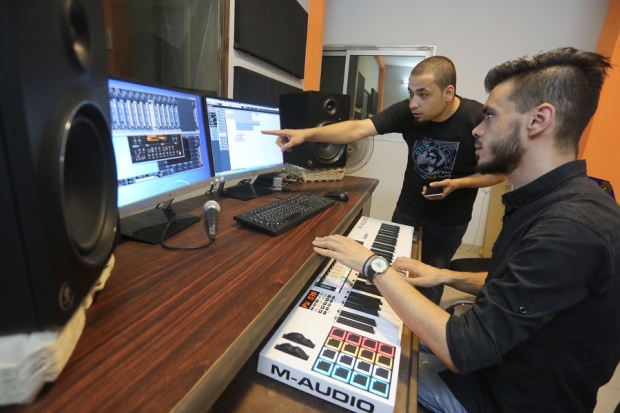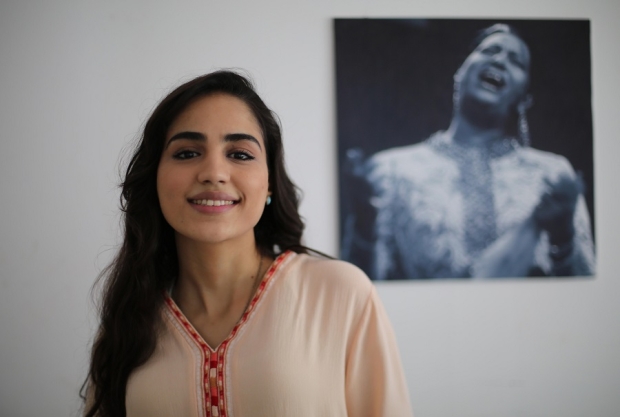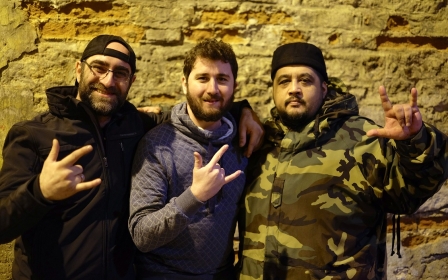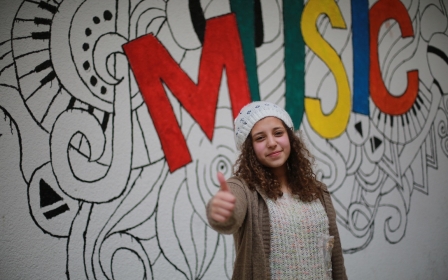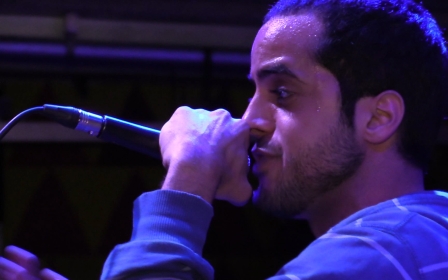Gaza's got talent: Young musicians and rappers hit the studio
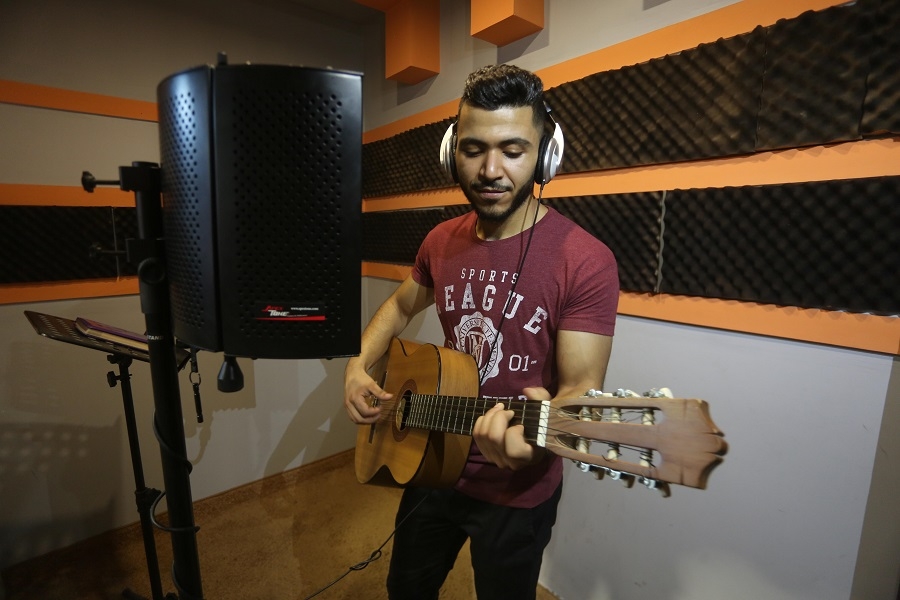
GAZA STRIP - Basheer Besaiso was 14 years old when he first bought a simple recording microphone for $4 to record his own words, using famous melodies from the internet.
“I wanted to know more about music. How is it made? What is a melody? What is a beat?” he told Middle East Eye in his recording studio in the al-Remal neighbourhood in Gaza.
"We used to gather inside my room and listen to music together. I used to listen to Tupac, Eminem, and Dr Dre,” he said.
In 2010, Besaiso started making electronic dance music (EDM) and published his music online.
“A lot of people encouraged me, but others told me that they didn't understand this type of music,” he said.
'You don’t have to be rich in order to be talented'
- Basheer Besaiso, co-founder of Scale music studio
Determined to continue learning, Besaiso kept improving his skills until he landed a job as a composer and producer at a local recording studio in 2012, where he met many local musicians and singers.
“I discovered that artists face a lot of hardships. There aren’t a lot of recording studios in Gaza, and we don’t have institutions that look after talents,” he said.
According to Besaiso, singers normally pay around 1500 shekels ($430) to record one song; this includes composing the melody plus arranging and mixing the song.
Inspired with the idea of being financially independent and helping other musicians, Besaiso managed to open a recording studio, Scale, in May 2016. He partnered with a Gazan friend who funded the studio with $8,000, while Besaiso manages the project.
According to Besaiso, he tries to help his peers by taking a fee of just 300 shekels ($80) for recording one song, enough to cover rent, electricity bills, fuel for the generator and make a decent profit.
“Sometimes I don’t require any payment from musicians [at all],” he said.
‘If you want to know anything about a country, just listen to its rap’
- Monem Awad, rapper
The long power cuts that have plagued the besieged strip are another challenge that the musicians face while composing their music.
“We used to work from 8am to 4pm, but now, we work from 10am to 2pm in order to use less fuel that costs us $200 a month,” he explained.
‘We don’t mention romance in our songs’
In 2016, the constant power cuts inspired rapper, Monem Awad, to write and compose the song, The Candle is Innocent, after three children died when their house caught fire. According to reports, a candle used during one of Gaza’s long power cuts caused the fire.
The song, which was recorded at his home studio and filmed by a friend for free, says:
We need light to see what is left in our life.
We don’t want to keep lighting candles and counting deaths
Who is responsible and who should be blamed?
The candle is innocent if you die oppressed
Awad, who lives in the Jabaliya refugee camp, north of Gaza City, believes that rap music is a form of expression that can show the reality of a given society or cause.
“If you want to know anything about a country, just listen to its rap,” he says.
“If you want to know anything about a country, just listen to its rap,”
- Monem Awad, rapper
One band in particular that has inspired the 26-year-old was DAM. Considered to be one of the first Palestinian rap bands singing in Arabic, their music has given an international audience a picture of what life under Israeli occupation and discrimination is like.
“Gaza rappers become very active during wars, political and social events. We don’t mention romance or love in our rap songs. It’s difficult to sing about these topics while living under such harsh conditions,” he said.
‘We don’t mention romance or love in our RAP songs. It’s difficult to sing about these topics while living under such harsh conditions’
- Monem Awad, rapper
Awad, who graduated from Al-Azhar university with a degree in nursing, works as a part-time taxi driver and teaches dabka, a traditional Palestinian dance.
In 2016, a Swedish initiative funded a project called Zouqaq, which granted Awad home studio equipment and taught him the basics of making music.
“I started to make my own music. Moreover, I help other rappers to record their songs for free using a very good microphone, a simple keyboard and a sound card.”
Awad is one of many musicians who recorded several songs at Besasio’s studio. “Basheer helped me once, and now I’m helping my peers,” he said.
Music dreams
Hadeel Fawzi, 28, used to sing at school and with her family, but at the age of 20 she starting meeting local musicians and learning from them in the hope of becoming a music teacher.
In 2013, she had the chance to sing on stage for the first time during a concert entitled Gaza Singing for Peace at the al-Mathaf hotel in Gaza City.
“A year ago, I started to come to Scale where I met Basheer Besaiso. I think that singing in a studio is safer," Fawzi said, who has recorded adverts and songs for local radio.
Fawzi has never experienced any physical threats or negative reactions from singing in public, but she and her family are concerned with how she will be perceived by her conservative neighbours, in Deir al-Balah, a refugee camp in southern Gaza.
"I live in Deir al-Balah, and people are not used to seeing women and girls singing, therefore, I prefer singing in a studio to prevent any social misunderstandings,” she explained.
There are currently no music colleges in Gaza, so Fawzi dreams of studying abroad to accomplish her dream of working as a music teacher for children and offer them what she never had.
Fawzi appreciates the role her parents have played in encouraging her. “My parents believe that I’m safe while being in the studio. I usually record advertisements and songs for local radios. My parents feel very happy while listening to any of my works in a taxi or in the streets.”
Fawzi and Monem were two of 12 singers and seven musicians that participated in the recording of Today We Sing. The goal of the piece was to demonstrate to the world how music is helping them face their daily struggles. After seven months of work and rehearsals, the Zouqaq project initiative was ready.
'My life is full of music'
Ahmed al-Haddad, 21, has a different story to tell. Haddad started playing music in 2011 during a visit to Egypt. Listening to famous underground bands, he fell in love with the sound of the guitar and started playing it.
To improve his skills, he watched YouTube videos, but his path was strewn with difficulties as his family was not supportive of his passion in the beginning.
“My family was affected by the general misunderstanding that music is related to bad people and places. During my first couple of years as a singer, I used to sing meaningful songs related to life values such as happiness, good deeds, and loving others. In time, my family discovered that music is a flexible art that reflects the performer and his beliefs.”
'My family was affected by the general misunderstanding that music is related to bad people and places'
- Ahmed al-Haddad, singer and musician
In 2014, Haddad formed a band called Nessan, becoming the lead singer and lead guitarist. Haddad sings cover songs of his favourite underground Egyptian bands, and tries to mix rock with oriental music.
He also plays bass guitar in wedding parties in Gaza. “I had a good experience in singing on stage. I played in many concerts and I have become well known in Gaza,” he said.
Last year, Haddad decided to try out a new experience and sing at Scale studio.
“It’s an amazing experience. In addition to improving my technical skills regarding recording in studios, I had the opportunity to record covers and publish them on social media.”
For Besaiso, Scale is his way of changing many misconceptions about music and musicians. “Music is about team work and respect. You don’t have to be rich in order to be talented. I want to prove that talent is enough for musicians to publish their work and improve their talents.”
“I hope to have the opportunity to share my work and my experience with international artists. We must send out our voices despite of all the woes and hardships,” he added.
Stay informed with MEE's newsletters
Sign up to get the latest alerts, insights and analysis, starting with Turkey Unpacked
Middle East Eye delivers independent and unrivalled coverage and analysis of the Middle East, North Africa and beyond. To learn more about republishing this content and the associated fees, please fill out this form. More about MEE can be found here.


